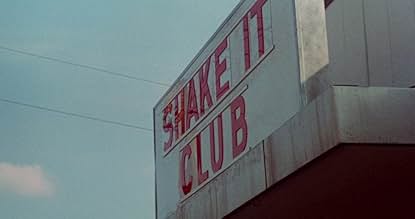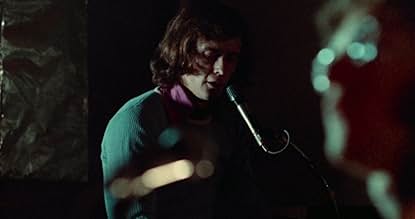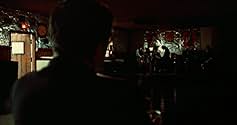Drama, das das alltägliche Leben und die Probleme einer typischen New Yorker Vorstadtfamilie zu Beginn der 1970er Jahre beschreibt.Drama, das das alltägliche Leben und die Probleme einer typischen New Yorker Vorstadtfamilie zu Beginn der 1970er Jahre beschreibt.Drama, das das alltägliche Leben und die Probleme einer typischen New Yorker Vorstadtfamilie zu Beginn der 1970er Jahre beschreibt.
Anthony D. Call
- Dr. Lauren
- (as Anthony Call)
Janet Sarno
- Night Nurse
- (as Jan Sarno)
Empfohlene Bewertungen
"The People Next Door" is an exploitation movie masquerading as an important social document. The cast, photography and production promise "class", while the script, direction and execution scream "cash-in".
Comfortable New York suburbanites Arthur and Gerrie Mason (Eli Wallach and Julie Harris) discover one night that their seemingly perfect 16-year old daughter, Maxie (Deborah Winters) has been tripping on LSD. Arthur, a smug, bullying braggart, immediately suspects his 17-year old (long-haired) son, Artie (Stephen McHattie) of supplying the drug to his sister, and kicks him out of the house. Whereupon, (suitably) confused Harris runs next door to seek advice from high school principal David Hoffman (Hal Holbrook) whose wife, Tina (a pre-"Phyllis" Cloris Leachman) is an alcoholic, and whose son Sandy (Don Scardino) has his own problems. Very sensibly, he advises love and understanding on the part of the parents, which all but goes out the window when Maxie confesses she has been tripping for quite a while now, is also sexually active and on THE PILL. Naturally,she just keeps getting worse--she's found by her father high on cocaine and in bed with a biker. From there, it's straight to family therapy where, among other things, it's revealed that Dad is having an affair with his lusty secretary (a pre-"Golden Girl" Rue McClanahan) and Mom knew it all the time. After another lamentably useless (and unintentionally hilarious) therapy session, the Masons decide to throw a party(?) which comes to an abrupt halt when one of the hired musicians is discovered puffing pot. Maxie then gets hold of more LSD, does a nude dance on her lawn and trips herself into a seedy mental hospital. The sight of her near-catatonic daughter in this horrible place drives Mom right to bed, where she remains until the film's climax.
More a catalog of just about every ailment bedeviling middle class families in the seventies than a worthwhile attempt at explaining them, "The People Next Door" lurches from one crisis to the next with very little happening in between. That's a shame, because the cast is excellent, but trapped in parts which are less like flesh and blood characters in a drama, than stereotypes in a ''Saturday Night Live'' sketch. For example, Wallach hypocritically swallows massive amounts of sleeping pills, Harris chain-smokes her way through the story, and all involved are on edge from beginning to end. Along the way, McHattie heads a rock band (dubbed by short-lived group, The Bead Game) principal Holbrook must deal with a student riot, and Wallach gooses Leachman when the opportunity arises. Yes, The movie gives you your money's worth in 93 minutes, that's for sure, but those who are wondering what the point is, will never find out. At least most B movies don't attempt to hide behind ''artistic'' pretensions.
Comfortable New York suburbanites Arthur and Gerrie Mason (Eli Wallach and Julie Harris) discover one night that their seemingly perfect 16-year old daughter, Maxie (Deborah Winters) has been tripping on LSD. Arthur, a smug, bullying braggart, immediately suspects his 17-year old (long-haired) son, Artie (Stephen McHattie) of supplying the drug to his sister, and kicks him out of the house. Whereupon, (suitably) confused Harris runs next door to seek advice from high school principal David Hoffman (Hal Holbrook) whose wife, Tina (a pre-"Phyllis" Cloris Leachman) is an alcoholic, and whose son Sandy (Don Scardino) has his own problems. Very sensibly, he advises love and understanding on the part of the parents, which all but goes out the window when Maxie confesses she has been tripping for quite a while now, is also sexually active and on THE PILL. Naturally,she just keeps getting worse--she's found by her father high on cocaine and in bed with a biker. From there, it's straight to family therapy where, among other things, it's revealed that Dad is having an affair with his lusty secretary (a pre-"Golden Girl" Rue McClanahan) and Mom knew it all the time. After another lamentably useless (and unintentionally hilarious) therapy session, the Masons decide to throw a party(?) which comes to an abrupt halt when one of the hired musicians is discovered puffing pot. Maxie then gets hold of more LSD, does a nude dance on her lawn and trips herself into a seedy mental hospital. The sight of her near-catatonic daughter in this horrible place drives Mom right to bed, where she remains until the film's climax.
More a catalog of just about every ailment bedeviling middle class families in the seventies than a worthwhile attempt at explaining them, "The People Next Door" lurches from one crisis to the next with very little happening in between. That's a shame, because the cast is excellent, but trapped in parts which are less like flesh and blood characters in a drama, than stereotypes in a ''Saturday Night Live'' sketch. For example, Wallach hypocritically swallows massive amounts of sleeping pills, Harris chain-smokes her way through the story, and all involved are on edge from beginning to end. Along the way, McHattie heads a rock band (dubbed by short-lived group, The Bead Game) principal Holbrook must deal with a student riot, and Wallach gooses Leachman when the opportunity arises. Yes, The movie gives you your money's worth in 93 minutes, that's for sure, but those who are wondering what the point is, will never find out. At least most B movies don't attempt to hide behind ''artistic'' pretensions.
Don't judge a book by its cover, or so the saying goes. Bloody good advice to tell you the truth! Is the same principle advised for movies? Well yes to some degree but much less so. After all, its only gonna take 90mins of your time to watch a movie. So what, right? Today's film is one I watched on account of its poster which I found in an exploitation movie art book, it depicted a somewhat haunting image of a white silhouette of a girl grabbing onto a tree in the dead of night; a distorted image that suggests something is not quite right. So, an eye-grabbing and odd poster, what about the film? Its about a dysfunctional family who experience serious problems when the teenage daughter develops a serious drug problem. Its an effective addiction drama, with a nice cast which includes Eli Wallach as the father. It does have melodramatic tendencies which anti-drug movies often have but that's okay in this case, as its never less than involving. So, a big yay to movie poster art - it makes you check out movies you never otherwise would.
Seemed like one of those after school special on troubled teens, preoccupied parents, and anti-drugs turned all the way up to 11. Wasn't in the mood for it.
unfortunately, the only treasured memory I have of this film is the fully nude hairy biker descending the stairs...I saw the SNEAK PREVIEW Of this movie in 1970, when I was ten, accompanied by my parents and my mother's 84 year old childhood governess. I can say that it was electrifying to me at that age to see a middle-class home thrown into chaos by naked tripping hippies. The governess did not have any comment, but what she must have been thinking...I always wondered if the male nude scene was later cut for general release, and if so was I privileged enough to see the DIRECTOR'S CUT with my parents and the governess...this would still be a fairly shocking film if seen today. needs a DVD release.
Sadly Eli's overacting and completely preposterous reactions to every single thing that happened wore extremely thin pretty rapidly. It's too bad because there's many things that work in this film. The music is very good and there's some very powerful scenes of confrontation and honesty. Seems to lose it's direction from time to time but eventually finds it's way back on track. It's easy to say these are messed up people, and maybe they are. But it was common and new and there was no frame of reference for people to cope with these issues. The neighbor's weren't any better. Parents are rarely ever portrayed realistically in movie throughout the decades. In this film the fathers were more over the top in their knee jerk reactions. The mothers were sympathetic and I did feel for them. The young adults were all excellent and once again I should say that the music was appropriate and absorbing. I can see why it garnered the praise it did and it's not nearly as dated as others from this era. This could have been a solid 6 or even a 7 if it wasn't for Eli's dundering incompetence. He should stick to westerns where his stilted dialogue delivery is easier to overlook. Editing was okay and the mood was consistent for the most part.
Wusstest du schon
- WissenswertesDavid Greene thought that the final cut of the film was so distorted that he tried, without success, to have his name removed from the credits.
- Zitate
Old couple's son: [to father] You are a shit! Why don't you just go away someplace and die? Just die!
- VerbindungenFeatured in Classroom Scare Films Vol. 5: More Drug Evils (1997)
- SoundtracksMama, Don't You Wait Up for Me
Written by Scott English (as Scott David English) and Larry Weiss
Sung by The Glass Bottle
Top-Auswahl
Melde dich zum Bewerten an und greife auf die Watchlist für personalisierte Empfehlungen zu.
- How long is The People Next Door?Powered by Alexa
Details
Box Office
- Bruttoertrag in den USA und Kanada
- 217.510 $
Zu dieser Seite beitragen
Bearbeitung vorschlagen oder fehlenden Inhalt hinzufügen





























